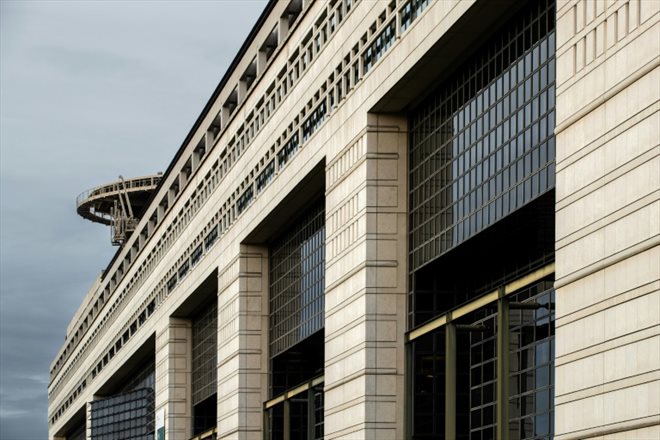The Ministry of the Economy, known as Bercy, on November 15, 2022 in Paris (AFP/Archives/JOEL SAGET)
The government plans for the first time since 2015 a drop in public spending next year, marking the end of the period of massive aid linked to Covid-19 and then to the energy crisis, according to a preparatory document for the 2024 budget published on Sunday. .
The credits granted to the various missions of the State for 2024, excluding interest on the debt, will reach 356 billion euros, down 4.8 billion euros compared to 2023, according to the “expenditure ceilings of the draft Finance Law 2024” published on Sunday and sent to Parliament.
Taking into account inflation, still forecast at 2.6% in 2024 by the government, the fall will amount to 3.5% in volume. This first decline in public spending for almost a decade is described as “historic” by the Minister Delegate for Public Accounts Gabriel Attal in an interview with the newspaper Les Echos published on Sunday.
The savings come for the most part from the gradual end, during 2024, of tariff shields on electricity and gas prices introduced to fight against inflation.
This represents nearly 14 billion euros in savings, to which is also added the end of the support desk for companies that consume a lot of energy.
– Return of budgetary rules –
Among the other ways of saving, already sketched out in recent weeks, spending on housing should be reduced with the abolition of the Pinel device and the overhaul of the zero-rate loan announced in June, the whole representing 2.3 billion euros. “term” savings according to Bercy.
For health, the government is counting on controlling sick leave and is also studying “avenues relating to the cost of drugs”, specifies Mr. Attal in his interview with Les Echos.
“With regard to work, unemployment is falling and spending can therefore also fall”, he says, recalling for example the objective of bringing the number of subsidized contracts back to its 2019 level and “to completely eliminate them in the market sector.
With the end of the Covid crisis and the return to normal of gas and electricity prices, the government is renewing with the requirement to bring public deficits below the 3% of GDP mark.
Suspended during the Covid, the European budgetary rules will apply again next year when the sharp rise in interest rates significantly increases the debt burden.
The government has set itself the objective of reducing France’s heavy debt to 108.3% of Gross Domestic Product in 2027 (compared to 111.6% at the end of 2022), which ranks it among the worst European students.
Mr. Attal has also not committed to a timetable for a new tax cut for the benefit of the middle classes and to the second stage of the reduction in production taxes for companies, specifying that this would depend on “margins of manoeuvre” linked to the economic situation.
– Environment, army, education –
However, budgetary and European constraints have not hindered all the revaluations of State missions.
Mr. Attal thus defended a “green deleveraging”, highlighting the seven billion euros of additional credits dedicated to ecological planning.
Emphasis will be placed on the energy renovation of housing, more ecological transport or even the “green fund” aimed at communities.
First ministry in terms of expenditure, National Education sees its appropriations increased to 64.2 billion euros, or 3.9 billion euros more.
The sovereign functions of the State, such as the army, the Interior and Justice, are also upgraded. The provisional defense ceiling is thus increased by 3.3 billion euros to 47.2 billion euros, which will benefit armaments and the revaluation of wages, according to Bercy.
© 2023 AFP
Did you like this article ? Share it with your friends with the buttons below.




